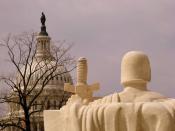When the Constitution was first created, the people of America feared another tyranny, like the one they just had escaped from Great Britain. Therefore, they wanted the central government to be as weak as possible. However, after the founding fathers saw the failures of Articles of Confederation, they realized that change was necessary. Therefore, the new government, (in which they outlined in the Constitution) was one in which the national government was more powerful. However, the founding fathers wanted to ensure that this new government was not one to be overrun by power-hungry officials. Consequently, they created a system of checks and balances in which each branch of government (the executive, judicial and legislative) could ensure that neither branch would become too powerful. But besides checking the power of government, the founding fathers wanted to check the power of the people as well. The authors of the constitution believed that most of the people of America were incompetent in the matters of running the government, and therefore they created many checks upon their power.
The national government under the constitution became one in which checks and balances were placed among all people, so that no entity became too powerful.
The national government was created in three branches, the executive, the judicial and legislative. The government felt that this distribution of power would allow the authorities of each branch be able to be more able to suit the particular needs and demands of each office as well as hinder both corruption and unseemly behavior of the officials in government. The legislative branch or the law-making body of government is broken up in power between the Senate, and the House of Representatives. The power of each house is shared among its many members, who are elected by the people at periodic intervals,


